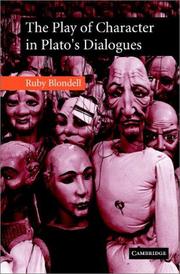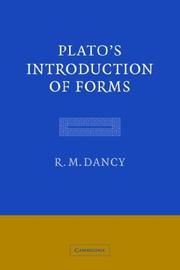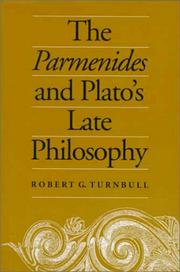| Listing 1 - 6 of 6 |
Sort by
|

ISBN: 0521793009 0521031427 1107122090 0511177089 0511157975 0511329881 0511482477 1280432985 0511047215 0511020325 9780511020322 9780511482472 9781280432989 9780521793001 9780511047213 9781107122093 9780511177088 9780511157974 9780511329883 9780521031424 Year: 2002 Publisher: Cambridge, UK New York Cambridge University Press
Abstract | Keywords | Export | Availability | Bookmark
 Loading...
Loading...Choose an application
- Reference Manager
- EndNote
- RefWorks (Direct export to RefWorks)
This book attempts to bridge the gulf that still exists between 'literary' and 'philosophical' interpreters of Plato by looking at his use of characterization. Characterization is intrinsic to dramatic form and a concern with human character in an ethical sense pervades the dialogues on the discursive level. Form and content are further reciprocally related through Plato's discursive preoccupation with literary characterization. Two opening chapters examine the methodological issues involved in reading Plato 'as drama' and a set of questions surrounding Greek 'character' words (especially ethos), including ancient Greek views about the influence of dramatic character on an audience. The figure of Sokrates qua Platonic 'hero' also receives preliminary discussion. The remaining chapters offer close readings of select dialogues, chosen to show the wide range of ways in which Plato uses his characters, with special emphasis on the kaleidoscopic figure of Sokrates and on Plato's own relationship to his 'dramatic' hero.
Characters and characteristics --- Characteristics, Personal --- Personal characteristics --- Characters and characteristics. --- Caractères et caractéristiques --- Caractérologie --- Characteristics [Personal ] --- Karakters en karakteristieken --- Philosophy, Ancient --- Personnages --- Philosophie ancienne --- Plato. --- Persons --- Typology (Psychology) --- Plato. - Dialogues. --- Arts and Humanities --- History

ISBN: 0521838010 9780521838016 9780511482502 9780521037181 051123063X 9780511230639 0511231407 9780511231407 0511229011 9780511229015 0511229852 9780511229855 0511482507 1280703172 9781280703171 1107161940 9781107161948 0511327374 9780511327377 0521037182 Year: 2004 Publisher: Cambridge Cambridge University Press
Abstract | Keywords | Export | Availability | Bookmark
 Loading...
Loading...Choose an application
- Reference Manager
- EndNote
- RefWorks (Direct export to RefWorks)
Scholars of Plato are divided between those who emphasize the literature of the dialogues and those who emphasize the argument of the dialogues, and between those who see a development in the thought of the dialogues and those who do not. In this important book Russell Dancy focuses on the arguments and defends a developmental picture. He explains the Theory of Forms of the Phaedo and Symposium as an outgrowth of the quest for definitions canvassed in the Socratic dialogues, by constructing a Theory of Definition for the Socratic dialogues based on the refutations of definitions in those dialogues, and showing how that theory is mirrored in the Theory of Forms. His discussion, notable for both its clarity and its meticulous scholarship, ranges in detail over a number of Plato's early and middle dialogues, and will be of interest to readers in Plato studies and in ancient philosophy more generally.
Forme (Philosophie) --- Form (Philosophy) --- Knowledge, Theory of. --- Théorie de la connaissance --- Plato. --- Knowledge, Theory of --- Epistemology --- Theory of knowledge --- Philosophy --- Psychology --- Idealism --- Matter --- Metaphysics --- Structuralism --- Arts and Humanities --- Plato. - Dialogues.
Book
ISBN: 0773418423 9780773418424 9780773439344 077343934X Year: 2011 Publisher: Lewiston, N.Y. Edwin Mellen Press
Abstract | Keywords | Export | Availability | Bookmark
 Loading...
Loading...Choose an application
- Reference Manager
- EndNote
- RefWorks (Direct export to RefWorks)
An attempt to explain how Plato's use of imagery in his dialogues affects his philosophy.
Plato -- Writing skill. --- Plato. --- Plato. Dialogues. --- Philosophy & Religion --- Philosophy --- Plato --- Writing skill. --- Platon --- Aflāṭūn --- Aplaton --- Bolatu --- Platonas --- Platone --- Po-la-tʻu --- Pʻŭllatʻo --- Pʻŭllatʻon --- Pʻuratʻon --- Πλάτων --- אפלטון --- פלאטא --- פלאטאן --- פלאטו --- أفلاطون --- 柏拉圖 --- 플라톤 --- Платон --- プラトン

ISBN: 0802042368 9786612025877 1282025872 1442682019 9781442682016 9781282025875 9780802042361 Year: 1998 Publisher: Toronto, Ont. University of Toronto Press
Abstract | Keywords | Export | Availability | Bookmark
 Loading...
Loading...Choose an application
- Reference Manager
- EndNote
- RefWorks (Direct export to RefWorks)
"From antiquity, Plato's Parmenides has been considered an enigma. In this book Robert Turnbull offers a translation and explanation of the Parmenides, using his interpretation to elucidate Plato's major late dialogues." "Turnbull claims that, in the Parmenides, Plato abandoned the earlier Phaedo account of form-participation, and instead, worked out the metaphysics of form-participation and mathematics that grounds the framework of his late philosophy. Relying on the testimony of Aristotle, Euclid, and Plotinus, and rejecting most modern accounts, Turnbull finds in the Parmenides a radical departure that clarifies and illuminates Plato's mature Pythagoreanism."--Jacket.
Philosophy, Ancient --- Philosophie ancienne --- Plato. --- Plato --- Aflāṭūn --- Aplaton --- Bolatu --- Platon, --- Platonas --- Platone --- Po-la-tʻu --- Pʻŭllatʻo --- Pʻŭllatʻon --- Pʻuratʻon --- Πλάτων --- אפלטון --- פלאטא --- פלאטאן --- פלאטו --- أفلاطون --- 柏拉圖 --- 플라톤 --- Electronic books. --- Plato. -- Dialogues. --- Plato. -- Parmenides. --- Philosophy --- Philosophy & Religion --- PHILOSOPHY / History & Surveys / Ancient & Classical. --- Parmenides (Plato) --- Dialogues (Plato) --- Platōnos Parmenidēs (Plato)
Book
ISBN: 1139334069 1107225841 1280773499 9786613684264 1139337432 1139339885 0511978081 1139341464 1139338307 1139336568 9781139336567 9780511978081 9781280773495 9780521871747 0521871743 9781139334068 9781107225848 6613684260 9781139337434 9781139339889 9781139341462 9781139338301 1108439411 Year: 2012 Publisher: Cambridge New York Cambridge University Press
Abstract | Keywords | Export | Availability | Bookmark
 Loading...
Loading...Choose an application
- Reference Manager
- EndNote
- RefWorks (Direct export to RefWorks)
As prose dramatic texts Plato's dialogues would have been read by their original audience as an alternative type of theatrical composition. The 'paradox' of the dialogue form is explained by his appropriation of the discourse of theatre, the dominant public mode of communication of his time. The oral performance of his works is suggested both by the pragmatics of the publication of literary texts in the classical period and by his original role as a Sokratic dialogue-writer and the creator of a fourth dramatic genre. Support comes from a number of pieces of evidence, from a statue of Sokrates in the Academy (fourth century BC) to a mosaic of Sokrates in Mytilene (fourth century AD), which point to a centuries-old tradition of treating the dialogues in the context of performance literature and testify to the significance of the image of 'Plato the prose dramatist' for his original and subsequent audiences.
Greek literature --- History and criticism. --- Plato --- Plato. --- Platon --- Aflāṭūn --- Aplaton --- Bolatu --- Platonas --- Platone --- Po-la-tʻu --- Pʻŭllatʻo --- Pʻŭllatʻon --- Pʻuratʻon --- Πλάτων --- אפלטון --- פלאטא --- פלאטאן --- פלאטו --- أفلاطون --- 柏拉圖 --- 플라톤 --- Платон --- プラトン --- Criticism and interpretation. --- History and criticism --- Greek drama --- Théâtre grec --- Histoire et critique --- Literary collections --- Ancient, Classical et Medieval --- bisacsh. --- Criticism and interpretation --- Arts and Humanities --- History --- Greek literature - History and criticism --- Plato - Criticism and interpretation --- Plato. - Dialogues
Book
ISBN: 9028901434 9789028901438 Year: 1976 Publisher: Antwerpen: De Nederlandsche boekhandel,
Abstract | Keywords | Export | Availability | Bookmark
 Loading...
Loading...Choose an application
- Reference Manager
- EndNote
- RefWorks (Direct export to RefWorks)
filosofie --- conflicthantering --- communicatie --- Didactic strategies --- Philosophy --- Plato --- Philosophy. --- Socrates --- 1 <38> PLATO --- KVH-AND --- ROLDUC-SEMI --- #GROL:SEMI-1-05'-04' Plat --- #GGSB: Filosofie --- #gsdbF --- 141.131 --- gesprekstechnieken --- 371.31 --- 10 --- Plato ca. 428-348 v. Chr. (°Athene, Gr.) --- Filosofie ; Plato --- 1.07 --- Dialectiek --- Mental philosophy --- Humanities --- Griekse filosofie--PLATO --- Didactische werkvormen --- Filosofie --- Filosofie ; filosofen (A - Z) --- 1 --- Socrate --- Socrates Constantinopolitanus Scholasticus --- Aflāṭūn --- Aplaton --- Bolatu --- Platon, --- Platonas --- Platone --- Po-la-tʻu --- Pʻŭllatʻo --- Pʻŭllatʻon --- Pʻuratʻon --- Πλάτων --- אפלטון --- פלאטא --- פלאטאן --- פלאטו --- أفلاطون --- 柏拉圖 --- 플라톤 --- 1 <38> PLATO Griekse filosofie--PLATO --- Plato, --- Plato. --- Socrates. --- Platon --- Platoon --- Платон --- プラトン --- C6 --- Opvoeding, onderwijs, wetenschap --- Plato - Dialogues --- Sokrates
| Listing 1 - 6 of 6 |
Sort by
|

 Search
Search Feedback
Feedback About UniCat
About UniCat  Help
Help News
News